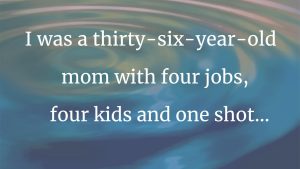Jessica Bloom-Foster
From the moment I walk into the room, she breaks my heart. She has just been sent to obstetrical triage from the ER, where an ultrasound has revealed a twenty-two-week pregnancy and a cervix dilated to four centimeters–halfway to delivery stage. She is moaning from her labor pains and moving restlessly on the narrow cot.
I am a second-year family medicine resident in a Midwestern hospital, and well past halfway through a busy call night. She is a thin, dusky-skinned woman, and she looks at me with wide, dark eyes full of sadness and pain. Her hair is pulled back with a nylon rag, and most of her front teeth are missing. Her face seems long and gaunt.
I take a rapid history before examining her, noting that she looks far older than her thirty-seven years. She tells me freely that she uses heroin and crack, is in a methadone program and smokes half a pack a day. She has not seen a doctor during this pregnancy. Her pains started at least twenty-four hours ago. This is her eighth child. She has only been using heroin for a few years. I ask her why she started using drugs, but she looks away and shakes her head, unable or unwilling to answer.
The longer we speak, the more difficult I find it to condemn her, despite the damage she has done to herself and her unborn baby; she is so honest and polite, answering me “Yes, ma’am” and “No, ma’am,” and her eyes are so full of bottomless guilt. During this brief interview, punctuated by her moans, I keep an eye on the monitors, where I see her contractions coming every few minutes and her baby’s heartbeat skittering along at around 150 beats per minute. She says she’s feeling a lot of pressure, like she has to go to the bathroom. I put two gloved fingers into her vagina to check her cervix, and I feel no cervix at all but the baby’s head, still covered with the slick membrane, pushing back against me.
Then there is a flurry of activity: I call in the nurse and the two other doctors (the fellow and the supervising physician), and the patient is wheeled speedily down to a labor room. Instruments are laid out, lights are turned on. We rush to put on paper gowns and sterile gloves; she is crying and asking if her baby is okay. I try to explain, gently, that the baby is coming too early, that there is nothing we can do to stop her labor now, and that there has never been a baby born this early who has lived.
With a few pushes, this tiny red baby comes out–a boy, the membranes a translucent mask over his face. His eyes are sealed shut, and his heartbeat is visible behind the tiny, bird-like ribcage. Quickly, quickly, I clamp and cut the umbilical cord, pull the membranes from his face and rush him to the nursery to weigh him.
The scale reads 440 grams–less than one pound, confirming that he was born too prematurely to survive. We cover his head with a small, striped knit cap and wrap his cooling body in a blanket like any other baby. It is just a matter of time now–just a matter of waiting for him to die.
I carry him back to the patient’s room. She is still lying on the bed with a bright light aimed between her legs, her bottom resting in a pool of amniotic fluid and congealing blood, her legs shaking. The fellow is still waiting for the placenta, so the supervising physician asks if she wants to see her baby.
She nods immediately, tears streaming. But she can only look at him a moment before turning away. When I ask if she wants to hold him, she shakes her head silently.
It is deep in the middle of the night, maybe 3 a.m. The paperwork takes about thirty minutes. I focus on converting the experience of the last half-hour into proper medical terminology and compartmentalizing my emotions until I can get this essential, tedious work done. I’ve been at work for more than twenty hours, and my neck and shoulders are burning with fatigue and tension. I feel the combination of hunger and nausea that occurs when I stay up most of the night.
Finally I’m caught up. I go to check on the patient. The placenta still isn’t out, and the fellow is staying with her while she sits on the toilet, pushing. The fellow tells me to lie down and get some sleep.
I am so grateful for the chance to be alone, use the bathroom, brush my teeth. I lie in the call room, feeling my body’s exhaustion and staring at the ceiling, thinking about the woman and her dead baby.
I’m relieved that we didn’t try to resuscitate the baby; I know it would have been futile and cruel to try. Yet in my mind I keep seeing the mother’s face with its heart-wrenching grief and guilt. And in my hands I keep feeling the insubstantial weight of the baby–and, under my index finger, his heartbeat fading away to cold stillness.
About the author:
Jessica Bloom-Foster MD wrote this piece as a journal entry while a family medicine resident. After a stint in private practice in Massachusetts, she was on the clinical faculty of the family medicine residency in Cedar Rapids, Iowa, for several years. She’s currently preparing to move to Bangor to join the residency faculty at Eastern Maine Medical Center and pursue her interests in integrative medicine and the medical humanities (not to mention hiking, camping and canoeing). Over the past ten years Jessica has published a smattering of essays and poems: “I have always found writing an essential activity that helps me record and process the experiences of medical training and practice.”
Story editor:
Diane Guernsey







